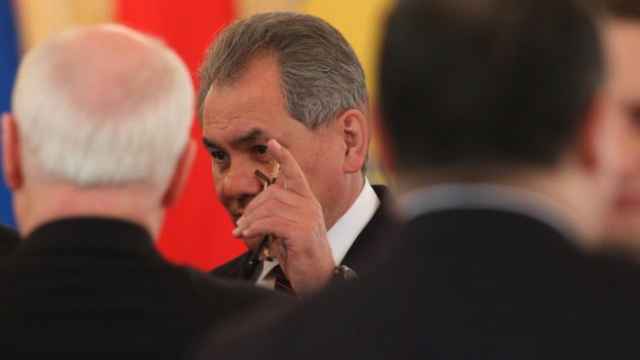Russia might deliver a long-overdue S-300 air defense missile system to Iran, honoring a contract that was canceled in 2010 following strong pressure from the West, Iranian and Russian media said on Tuesday.
Russian Defense Minister Sergei Shoigu is visiting Tehran and signed an agreement with Iranian Defense Minister Brigadier General Hossein Dehghan to boost cooperation, Iran's Fars semi-official news agency said.
Russia's TASS news agency quoted Shoigu as saying the agreement hashed out a "theoretical framework of cooperation in the military sphere," and also features an increase in naval cooperation, particularly visits by Russian and Iranian naval forces to each other's ports.
Although Shoigu made no mention of a breakthrough in arms negotiations with the two countries — which have both come under western sanctions — Iran's Fars said that Moscow and Tehran would resolve problems with the delivery of the advanced missile system.
Russian state news agency RIA Novosti confirmed the issue was under discussion.
"A step was taken in the direction of cooperation on the economy and arms technology, at least for such defensive systems such as the S-300 and S-400. Probably we will deliver them," RIA Novosti quoted Colonel General Leonid Ivashov as saying.
Ivashov is the former head of the defense minister's department of international cooperation.
No further details were immediately available.
Dmitry Medvedev, then the Russian president, canceled a contract to supply Tehran with the advanced missile system in 2010 in the wake of United Nations sanctions imposed on Iran over its disputed nuclear program.
The United States and Israel heavily lobbied Russia to block the missile sale, saying it could be used to shield Iran's nuclear facilities from possible future air strikes. Iran in turn has taken Russia to arbitration to finalize the sale.
Ivashov said that Russia's ties with Iran had strengthened recently due to Western sanctions that they are both now facing and added that the two countries were looking to expand their cooperation in other areas.
The S-300 advanced missiles have a 125-mile (200-km) range and Russia has stoked tensions with the West by trying to sell the system to other Middle Eastern countries, including Syria.
Russia's ties with the West are at Cold War lows over the conflict in Ukraine, where Kiev says Moscow has sent troops and arms to support pro-Russian rebels in the country's east. Russia denies the allegations.
Material from The Moscow Times was included in this report.
A Message from The Moscow Times:
Dear readers,
We are facing unprecedented challenges. Russia's Prosecutor General's Office has designated The Moscow Times as an "undesirable" organization, criminalizing our work and putting our staff at risk of prosecution. This follows our earlier unjust labeling as a "foreign agent."
These actions are direct attempts to silence independent journalism in Russia. The authorities claim our work "discredits the decisions of the Russian leadership." We see things differently: we strive to provide accurate, unbiased reporting on Russia.
We, the journalists of The Moscow Times, refuse to be silenced. But to continue our work, we need your help.
Your support, no matter how small, makes a world of difference. If you can, please support us monthly starting from just $2. It's quick to set up, and every contribution makes a significant impact.
By supporting The Moscow Times, you're defending open, independent journalism in the face of repression. Thank you for standing with us.
Remind me later.





